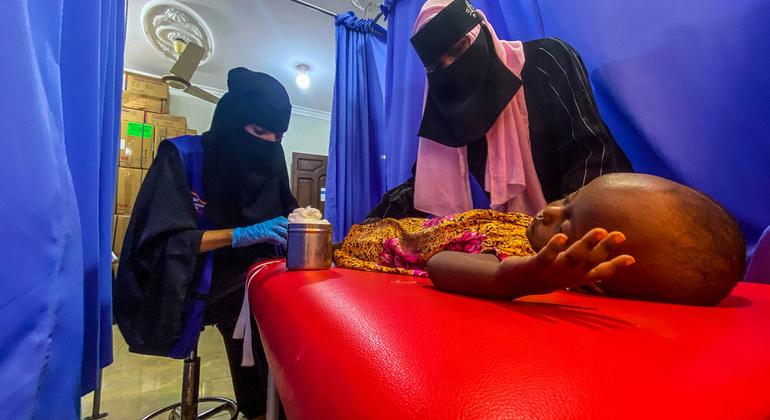
It also provides nutrition screening services in more than 270 districts. These centres have achieved 96 per cent cure rates which is well above the international standard.Nearly one in two under-fives also suffer from moderate to severe stunting, said WHO, pointing out that this adds up to nearly 2.4 million children.Mr. Griffiths said it had been “the privilege of my life” to be in the role of relief chief in a post on X, thanking all partners and supporters for championing those caught up in crises.“We’ve also been able to provide food rations to people in very difficult neighbourhoods, including Cité Soleil”, he said.
Increasingly vulnerable
“He advocated tirelessly for life-saving aid to reach those most in need and for the resources needed to do so” and has played a “key role” in leading the humanitarian response, negotiating solutions to some of the most intractable crises. According to the UN health agency (WHO), almost 18 million people need medical assistance and half of that number are children.The Under-Secretary-General for Humanitarian Affairs, Martin Griffiths, announced on Monday that he is stepping down from the top aid job for health reasons.Cholera has killed nine people in the last week across Somalia and more than 50 in recent months, UN aid teams said on Monday.More than six in 10 of the deceased have been children under five in an outbreak that’s being driven by high levels of malnutrition, poor access to clean water and toilets along with open defecation.For its part, the World Food Programme’s (WFP) Haiti chief, Jean-Martin Bauer, said that yesterday they were able to provide more than 17,500 hot meals to displaced people each day.
Deadly cholera infections spreading fast in Somalia, warn UN aid teams
As part of the ongoing aid response, about 1.4 million cholera vaccine doses have been approved. More than 100 cholera kits have also been prepositioned across the country, with enough supplies to treat 10,500 patients.The alert from UN aid coordination office, OCHA, confirms that the preventable disease is spreading, with increasing numbers of infections reported in Hirshabelle, Puntland and South West states.This has left communities vulnerable to worsening conditions, including climate change.
Cases rise in the capital
Mr. Griffiths, who heads the Office for the Coordination of Humanitarian Affairs (OCHA), took on the job in July 2021, at a time of mounting humanitarian needs and shrinking resources.The Somali capital, Mogadishu, has also seen a spike in cholera cases in the last two weeks while the UN health agency, WHO, reported three times more infections so far in 2024 than in the last three years.Fighting in Yemen between the internationally recognised government in Aden and mainly Houthi rebels who occupy the capital, Sana’a and other territory, has been accompanied by a significant decline in international support.
UN relief chief stepping down
Despite the challenges, WHO is supporting the Ministry of Health and local partners with supplies and logistics, including water, sanitation and hygiene and disease surveillance in centres for displaced people.The outbreak is expected to escalate when the Gu rains start next month, especially in high-risk districts located along the Shabelle and Juba River basins.In the last five years, funding for WHO activities in the country has fallen by 45 per cent. This year, the UN agency needs million to provide essential health assistance.It noted that some 4.5 million individuals are still internally displaced today, with women and children accounting for about eight in 10 of those affected.UNICEF and its partners continue to provide psychosocial support to those impacted and humanitarians continue to strongly appeal to all parties to urgently allow unhindered, safe access to people in need.Violence and insecurity is continuing to disrupt aid operations in the Haitian capital Port-au-Prince said OCHA on Monday, while WHO warned that less than half of health facilities in the capital are functioning at their normal capacity.
Haiti: Insecurity and violence continues
The crisis stemming from years of political and economic upheaval has crippled healthcare relief operations and hindered access to the few remaining facilities.Last year, natural shocks – particularly heavy rains and flash-flooding – were the main cause of new displacement in Yemen, the UN health agency said.As an example of the volatile environment stemming from the rampant gang activity and human rights abuses which have gripped the capital, Bernard Mevs hospital, which had recently reopened, was forced to suspend its operations again due to insecurity, said Mr. Haq.WHO today supports 96 therapeutic feeding centres, enough to help around 30,000 children per year.
Hot meals in hard to reach areas
“It’s important to step back and remember that hungry children, disease outbreaks, hospitals shutting down … are not to be normalized,” said Dr Hanan Balkhy, WHO Regional Director for the Eastern Mediterranean.“The Secretary-General extends his deep gratitude and appreciation to Mr. Griffiths for his tremendous leadership and service to the United Nations and the humanitarian community in advocating for people affected by crises and mobilizing resources to address their needs”, said Mr. Haq.He informed the Secretary-General of his decision earlier in the day but he will remain in post until the end of June to ensure a smooth transition, said the Deputy UN Spokesperson, Farhan Haq, briefing correspondents.